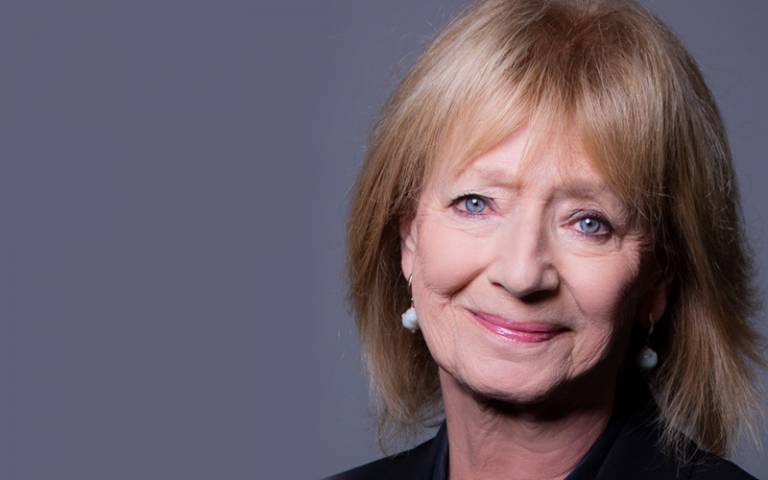Vice-Provost’s View: After It’s All Academic – taking UCL advancement to the next level
8 December 2020
Professor Dame Hazel Genn on successful completion of the campaign in 2020 and moving into the next phase of UCL’s philanthropy and engagement.

As we approach the festive season, I am delighted to have the opportunity of reflection on 2020 and what comes next, in which coronavirus is not the main focus.
I’ve been privileged this year to have stepped into the shoes of not one but two brilliant women as interim Vice-Provost (International and Advancement), after Nicola Brewer (International) and Lori Houlihan (Advancement) moved on this year. In taking over the leadership of these two excellent teams, who contribute so much to UCL’s impact, reputation and profile, I have inherited a lot to celebrate and a lot to look forward to with optimism and excitement.
In the Global Engagement Office, we have celebrated the first five year Global Engagement Strategy (GES) that delivered so much for UCL, and provides an excellent foundation for the next five. Building on the consultation we did last academic year, we are grateful that many academic and professional services colleagues recently participated in Task & Finish Groups looking at student experience, research and education, alumni engagement and profile raising through a global lens. I look forward to updating you early next year on what came out of these groups, and the shape of the emerging GES 2021-26.
In this View, however, I want to focus on what has been a really big year for OVPA. Many of you will have been present in September 2016 when Professor Michael Arthur announced that UCL’s new It’s All Academic Campaign would raise £600m and 250,000 volunteering hours to advance UCL’s long-term priorities and ambitions. It was one of the biggest university campaigns in Europe and one of the first to put engagement on an equal footing with fundraising.
Four years later, we have exceeded those targets a year earlier than expected, with £624m and 263,000 volunteer hours raised. That represents a huge level of positive impact:
- £70m for student support, improving access and a better experience for students who might otherwise have not been able to make the most of UCL or not been able to take up a place at all.
- £432m for health-related research and translation, escalating the pace at which tenacious, life-limiting illnesses such as cancer, dementias, Parkinson’s and most recently COVID can be understood and tackled.
- Millions of pounds more in funding for a range of other priorities and projects, from artificial intelligence to global innovation and prosperity.
And the accelerated growth of an international community, with nearly 12,000 new donors and more than 10,000 first time alumni volunteers, representing around 85 different countries.
I hope the whole of UCL feels proud of that success. Our achievement is impressive and represents a lot of creative and collaborative effort. Even more importantly, the work we have done and the lessons we have learnt have laid a firm foundation for long-term, sustainably growing philanthropy and engagement that supports UCL to plan ambitiously and confidently in uncertain times.
The most significant aspect of this campaign is that it has been a whole university endeavour, marking a step change in UCL’s evolution from a university with an advancement office to an advancement university. Since 2014, its shape, priorities and progress have been guided by an Internal Campaign Steering Group, of which I’ve been a member, and this has been critical in ensuring joined-up cross-UCL input and responsibility.
A great many academic and professional services colleagues have also shared their contacts and expertise, and given time to steward alumni and donors, put together cases for support, and help to demonstrate that, if you want to invest time or money to make a difference, UCL is the best place to do it. As a result, we are ending the campaign with a far wider understanding of philanthropy and engagement and a far greater level of cross-UCL collaboration than we began.
The impact, I think, has also been a whole university one. Not every part of UCL has directly benefited with specific funding or volunteering but there is an overall shared benefit; when the tide comes in, all ships rise.
Another key outcome has been the increase in international engagement with UCL. We are now on the radar of major global philanthropists who are driven by an ethos of ‘change not charity’ and are seeking dynamic partners with which to drive that change. Over the course of this campaign, we have seen an increased willingness of these funders to engage with UCL, often thanks to the fact that we are working closely with academics and influential alumni.
That momentum doesn’t stop. The It’s All Academic Campaign is closed, but the energy OVPA puts into fundraising and engagement is not on pause. As we go into 2021, the team is already planning with new President & Provost Dr Michael Spence the next stage of UCL’s fundraising and engagement. We are working as hard as ever to support UCL’s ability to be nimble, fast-moving and flexible in the post-pandemic world. We want to grow our reach and presence, and therefore our impact, throughout UCL, increasing the number of departments with which we work closely. Moves to make that happen are already underway.
It is rare to be saying farewell to a year in which it is so difficult to predict what the next 12 months will bring. One thing we can confidently say is that, whatever challenges the world faces, UCL will be part of providing the solutions. And philanthropy and engagement will be a major partner in bringing those solutions to fruition.
 Close
Close

